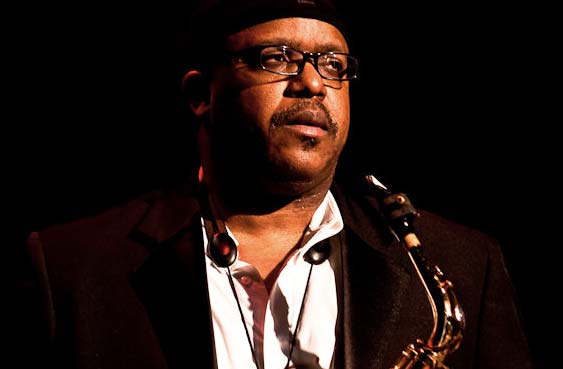Secrets from the World’s Most Prolific Saxophone Transcriber
 Any devoted jazz saxophone player with an internet connection knows Charles McNeal’s love letter to jazz history, CharlesMcNeal.com. As a Facebook friend of Charles myself, there are periods where he cranks out, literally, a transcription each day. As an equal opportunity transcriber, he’s taken down hundreds of solos from all ends of the jazz legend spectrum, from Zoot Sims to Michael Brecker to Junior Cook and the list goes on further than you could ever imagine. To my knowledge, there is no other individual on this planet jotting down as many solos as McNeal.
Any devoted jazz saxophone player with an internet connection knows Charles McNeal’s love letter to jazz history, CharlesMcNeal.com. As a Facebook friend of Charles myself, there are periods where he cranks out, literally, a transcription each day. As an equal opportunity transcriber, he’s taken down hundreds of solos from all ends of the jazz legend spectrum, from Zoot Sims to Michael Brecker to Junior Cook and the list goes on further than you could ever imagine. To my knowledge, there is no other individual on this planet jotting down as many solos as McNeal.
Specializing in transcriptions of saxophone players, Charles is a great player in his own right as a professional musician in Las Vegas who’s performed with the folks such as Wynton Marsalis, McCoy Tyner, Roberta Flack, The Temptations, Boz Scaggs, and so many more.
As you’d imagine, Charles has a lot to say about his craft, so if you are a transcriber yourself, or if you’re still on the fence about whether to become one, you’ll want to read ahead.
The Interview
Doron Orenstein: What is it that caused you to transcribe as much as you do?.
Charles McNeal: I started transcribing because I felt there were holes in my development as a jazz musician that transcribing could help with. Mainly it was the development of my ears and the ability to hear better. Also I wanted to learn how to play some of the things I heard played by my favorite saxophonists.
DO: During your most prolific periods, how many solos will you crank out in a week?
CM: I only transcribe 4 or 5 days a week. If I’m really on a roll I can do a solo a day, spending up to 6 to 8 hours on a particular solo. But I feel it’s better to spend 2 or 3 hours on a solo and spread it out over a few days.
DO: How has your extensive transcription impacted your playing?
CM: The most obvious benefit is that I hear a lot better! I also recognize certain phrases instantly because they are used by so many jazz saxophonists. Having to notate the solos has helped my reading. Reading through a lot of the solos has helped my phrasing and sound quite a bit. Transcribing has also helped with my confidence when it comes to learning music by ear, which I think is one of the best things you can do.
DO: Can you name a few of your favorite all-time saxophone solos?
CM: All-time favorite solos…too many to mention. I will list the solos that I have transcribed that I really enjoy. Michael Brecker’s solo on Confirmation and Pools, Stan Getz’s solo on Seven Steps To Heaven, Sonny Stitt’s solo on Tour De Force, Dexter Gordon’s solo on Red Cross. All those solos are a joy to listen to and they contain a ton of language that can be learned through studying them.
DO: Is there any equipment you’d recommend to aid musicians transcribing solos?
CM: I use ‘Transcribe‘ but any program that can slow down a solo and loop sections of a solo will do. A little side note. I don’t slow anything down more than 50%. If you slow a solo down too much you start hearing a lot of unintentional notes. I rather transcribe what I feel is the soloist’s intention instead of what you hear when the solo is slowed down to 20% of the original tempo. Also a great pair of headphones helps a lot.
DO: For someone new to transcription, which saxophone greats would you recommend they transcribe first?
CM: I think it’s a good idea to start with players who play inside the changes so that you can analyze what you hear to what is being played over the chords. It’s also a good idea to start with someone who plays pretty straight with their time. I always find it easier to hear a grouping of 4 notes as opposed to a grouping of 7 notes. I would say start with Lou Donaldson, Dexter Gordon, Sonny Stitt, Lester Young, Wardell Gray, Stan Getz, etc. Also, it’s easier to transcribe a solo over a medium uptempo tune (tends to be very few double-time runs) as opposed to ballads.
DO: Do you have any general tips you could offer to someone new to transcribing?
CM: Go slow!! Start with 1 or 2 notes at a time if that’s all you can hear. I still run into phrases where I have to pick out 1 or 2 notes at a time. Start with 30 minutes a day and try to work up to an hour or 2. Sing the notes that you are transcribing. A lot of people say you should be able to sing the whole solo before you start trying to transcribe. I feel that’s a great way to hear what’s going on, I just have never done it. I sing along with the phrase I’m transcribing at the moment. Also start with a solo that you feel confident that you can transcribe, no need to start with a 15 minute Michael Brecker extravaganza. I still transcribe with horn in hand. I can get some phrases by playing them on the piano but I’m just much faster with the horn. I’m a believer in doing what works for you. If you can transcribe by using your ears only that’s great and definitely something to be proud of, but if you need to use your horn or the piano to double check the notes, go ahead. The main thing is to transcribe!
DO: Right now your transcriptions are available for free download on your website. Do you have any plans to make these available in any other way, such as a published book?
CM: My plan is to post 500 free transcriptions (I have about 350 posted now). After that I hope to put all future solos into transcription books that you’ll be able to purchase from my website. I’m currently working on my first book so that I can learn what goes into self publishing a transcription book. I hope to transcribe around 1000 solos – at least that’s my goal.
DO: What’s your saxophone equipment setup?
CM: I own several horns but my main setup is:
- Tenor: Selmer Mark VI with a Pillinger NYT 7* mouthpiece with med. hard reeds (no particular favorite reeds).
- Alto: Selmer Super Action 80 Series II with an Hard Rubber ARB 5* mouthpiece with med. hard reed (no particular favorite).
I like changing up equipment and have never looked for the ultimate setup. I like the slight differences in sound that I get from using different horn/mouthpiece combinations.






July 14, 2011 @ 6:29 am
A great player and prolific transcriber!!
July 14, 2011 @ 7:52 am
Thanks Jeff, I completely agree!
July 14, 2011 @ 8:08 pm
Hey Doron,
Nice article on Charles. Although I am a trumpet player
I love his transcriptions and exercises pdfs. By the way I live in New Jersey.
July 14, 2011 @ 9:34 pm
Hey Stephen,
Great to have a brass man visiting this slice of saxo-land! With solos, it really doesn’t matter what instrument is being transcribed. In fact, sometimes I think it’s better to play solos from other instruments as you end up with lines that don’t naturally fall under the fingers for your instrument thus expanding your musical vocabulary.
Jersey, wow, I have a lot of memories of Greek diners out there, good times…
Doron
July 15, 2011 @ 8:10 am
Charles McNeal is a very generous person for sharing so readily his work. Though I look at the act of transcription as primarily (for me, not necessarily for others) an exercise in improving my ear (and therefore prefer to make my own transcriptions), I still find value in playing transcriptions made by others (sight reading, technical challenges, etc.) For that reason I visit his Site from time to time. Amazing his output! One of the things he said in the interview about singing each transcribed solo should be an essential practice for anyone studying and/or transcribing a solo. Lennie Tristano, Warne Marsh, Lee, Konitz, et. al., always adhered to this practice. It helped them to really internalize and hear very, very clearly what the soloist was doing. Anyhow, thanks for such an informative interview.
July 16, 2011 @ 10:57 am
Hello Bill,
Yes, “generous” is most certainly the right word when it comes to describing Charles. I know that I’ve gotten tremendous benefit out of transcribing solos myself, especially studying how with the great players, one idea develops out of the one before it. Really, there is so, so much to learn from this practice.
In any event, I’m so glad that you enjoyed the interview, hope you continue to stop by the site.
Best,
Doron
July 20, 2011 @ 10:23 pm
cool article, and charles’ website seems like a great resource. Anybody else have any trouble accessing the transcriptions though? I’ve tried opening and downloading them in Chrome and Firefox with no success.
July 21, 2011 @ 8:17 am
Hello Dylan,
I just downloaded one of his transcriptions successfully, so I’m not sure why you might be having problems. I would think that right-click on the link (making sure that your mouse is truly over the link so that the hand pointer appears) to the PDF and saving would do the trick.
Also, I’m not sure if you already know this, but you need to have Adobe Acrobat installed in order to see these.
I hope that helps,
Doron
August 16, 2022 @ 6:49 pm
Doron just fyi if you didn’t know his website is/has been down “more than a week,” acc to isitdownrightnow.com.
August 16, 2022 @ 9:15 pm
Oh man, thanks for the heads-up – that’s too bad(!). Right now, it looks like the only way you can get to the site is via the internet archive at https://web.archive.org/web/20200704023538/http://charlesmcneal.com/Transcriptions.html.
I’ll see if I can get a hold of Charles and post here if it turns out there is another home for this archive.
Thanks again!
January 9, 2023 @ 10:22 am
Thank you for another great interview. Big Charles McNeal and BSWE fan here.